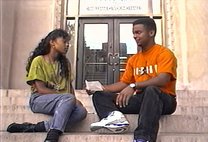Oral history interview with Emil L. Smith
- 1991-Jun-19 (First session)
- 1994-Mar-17 (Second session)
Oral history interview with Emil L. Smith
- 1991-Jun-19 (First session)
- 1994-Mar-17 (Second session)
Emil Smith begins his oral history interview by discussing his undergraduate study of biology at Columbia University. He received a Guggenheim fellowship to Cambridge University until the outbreak of World War II. Smith accepted a position at the University of Utah and later University of California, Los Angeles. Smith describes his research interests: peptidases, immunoglobulins, cytochromes, subtilisin, histones, and glutamate dehydrogenases.
| Property | Value |
|---|---|
| Interviewee | |
| Interviewer | |
| Place of interview | |
| Format | |
| Genre | |
| Extent |
|
| Language | |
| Subject | |
| Rights | Creative Commons Attribution-NonCommercial-NoDerivatives 4.0 International License |
| Rights holder |
|
| Credit line |
|
About the Interviewer
James J. Bohning was professor emeritus of chemistry at Wilkes University, where he had been a faculty member from 1959 to 1990. He served there as chemistry department chair from 1970 to 1986 and environmental science department chair from 1987 to 1990. Bohning was chair of the American Chemical Society’s Division of the History of Chemistry in 1986; he received the division’s Outstanding Paper Award in 1989 and presented more than forty papers at national meetings of the society. Bohning was on the advisory committee of the society’s National Historic Chemical Landmarks Program from its inception in 1992 through 2001 and is currently a consultant to the committee. He developed the oral history program of the Chemical Heritage Foundation, and he was CHF’s director of oral history from 1990 to 1995. From 1995 to 1998, Bohning was a science writer for the News Service group of the American Chemical Society. In May 2005, he received the Joseph Priestley Service Award from the Susquehanna Valley Section of the American Chemical Society. Bohning passed away in September 2011.
Institutional location
| Department | |
|---|---|
| Collection | |
| Oral history number | 0096 |
Related Items
Interviewee biographical information
| Born |
|
|---|---|
| Died |
|
Education
| Year | Institution | Degree | Discipline |
|---|---|---|---|
| 1931 | Columbia University | BS | Biology |
| 1937 | Columbia University | PhD | Zoology |
Professional Experience
Columbia University
- 1931 to 1934 Teaching Assistant, Zoology Department
- 1934 to 1936 Teaching Assistant, Biophysics
- 1936 to 1938 Instructor, Biophysics
University of Cambridge
- 1938 to 1939 John Simon Guggenheim Memorial Fellow, Molteno Institute
Yale University
- 1939 to 1940 John Simon Guggenheim Memorial Fellow
Connecticut Agricultural Experiment Station
- 1939 to 1940 John Simon Guggenheim Memorial Fellow
Rockefeller Institute for Medical Research
- 1940 to 1942 Fellow
E.R. Squibb & Sons
- 1942 to 1946 Senior Biochemist and Biophysicist
University of Utah
- 1946 to 1950 Associate Professor of Biochemistry and of Medicine
- 1950 to 1963 Professor of Biochemistry, Research Professor of Medicine, and Head, Biochemical Section, Laboratory for the Study of Hereditary and Metabolic Disorders
- 1958 to 1959 Acting Chairman, Department of Biochemistry
University of California, Los Angeles. School of Medicine
- 1963 to 1979 Professor and Chairman, School of Medicine, Department of Biological Chemistry
University of California, Los Angeles
- 1979 to 1996 Professor Emeritus
Honors
| Year(s) | Award |
|---|---|
| 1961 | Distinguished Service Alumni Award, Columbia Universty |
| 1962 | Member, National Academy of Sciences |
| 1964 | Utah Award, American Chemical Society |
| 1965 | Member, American Academy of Arts and Sciences |
| 1973 | Member, American Philosophical Society |
| 1982 | Foreign Member, Academy of Sciences, USSR |
| 1985 | Fellow, UCLA School of Medicine |
| 1987 | Stein-Moore Award, The Protein Society |
Cite as
See our FAQ page to learn how to cite an oral history.
Complete transcript of interview
smith_el_0096_FULL.pdf
The published version of the transcript may diverge from the interview audio due to edits to the transcript made by staff of the Center for Oral History, often at the request of the interviewee, during the transcript review process.









